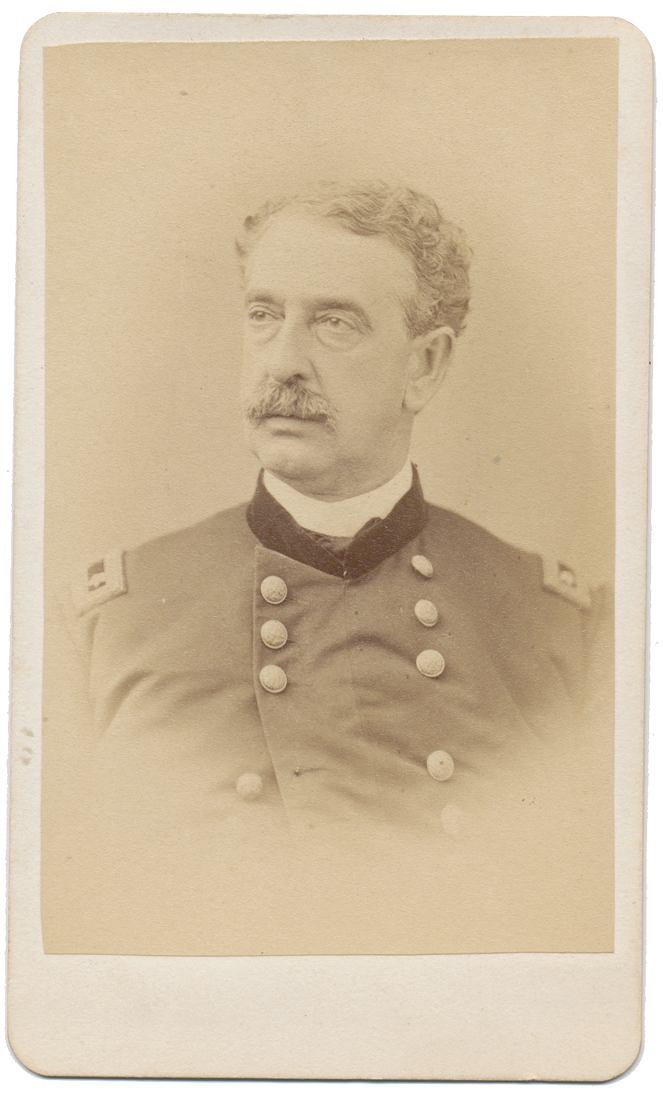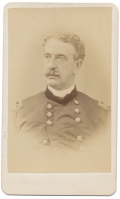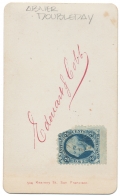site search
online catalog
POST WAR IMAGE OF MAJOR GENERAL ABNER DOUBLEDAY

$175.00 SOLD
Quantity Available: None
Item Code: 1094-137
Post-war era view of the General in a dark double-breasted overcoat with black felt collar and major general’s shoulder straps. Aside from the post-war mount the viewer can also notice the General looks a bit older with lighter hair.
Contrast and clarity are good as is the mount and paper.
Reverse has a photographer’s mark for EDOUART COBB…SAN FRANCISCO. There is also a 2-cent tax stamp that looks to have been added. Top has a modern pencil ID.
Abner Doubleday was born June 26, 1819 in Ballston Spa, New York. He entered West Point in 1838 and graduated in 1842 ranking 24th in his class. He was assigned as a 2nd Lieutenant in the 3rd US Artillery. Doubleday served in the Mexican and Seminole Wars before being assigned to duty in the coastal forts. In 1858 he was sent to Fort Moultrie and was part of the garrison moved by Major Robert Anderson to Fort Sumter in Charleston Harbor in 1861. He was present for the bombardment of Fort Sumter on April 12, 1861 and even aimed the cannon that fired the first shot in reply to the Confederate assault.
Doubleday was appointed Brigadier General of Volunteers on February 3, 1862 and assigned to duty in northern Virginia. His first combat assignment was to lead the 2nd Brigade, 1st Division, 3rd Corps of the Army of Virginia during the Second Battle of Bull Run.
With Doubleday in command the 1st Division was eventually assigned to the 1st Corps of the Army of the Potomac. At Antietam, he led his men into the deadly fighting in the Cornfield and the West Woods. He was wounded when an artillery shell exploded near his horse, throwing him to the ground in a violent fall. He was promoted in March 1863 to Major General of Volunteers. At Fredericksburg in December 1862, Doubleday’s Division mostly sat idle. During the winter, the 1st Corps was reorganized and Doubleday assumed command of the 3rd Division. At Chancellorsville in May 1863, the division was kept in reserve.
At the start of the Battle of Gettysburg, July 1, 1863, Doubleday's Division was the second infantry division on the field to reinforce the Cavalry Division of Brigadier General John Buford. When his Corps Commander, Major General John F. Reynolds, was killed very early in the fighting, Doubleday found himself in command of the Corps. His men fought well in the morning, putting up a stout resistance, but as overwhelming Confederate forces massed against them, their line eventually broke and they retreated back through the town of Gettysburg to the relative safety of Cemetery Hill south of town. It was Doubleday's finest performance during the war.
On July 2, 1863, Army of the Potomac commander Maj. Gen. George G. Meade replaced Doubleday with Major General John Newton, a more junior officer. Doubleday was humiliated by this snub but he returned to division command and fought well for the remainder of the battle. He was wounded in the neck on the second day of Gettysburg and received a brevet promotion to Colonel in the Regular Army for his service. He formally requested reinstatement as 1st Corps commander, but Meade refused, and Doubleday left Gettysburg on July 7 for Washington.
Doubleday assumed administrative duties in the defenses of Washington, D.C., where he was in charge of courts martial proceeding. His only return to combat was directing a portion of the defenses against the attack by Early in the Valley Campaigns of 1864.
After the Civil War, Doubleday mustered out of the volunteer service on August 24, 1865 and reverted to the rank of Lieutenant Colonel, and became the Colonel of the 35th U.S. Infantry in September 1867. He was stationed in San Francisco from 1869 through 1871. He commanded the 24th U.S. Colored Infantry with headquarters at Fort McKavett, Texas. He retired from the Army in 1873.
Doubleday spent much of his time writing. He published two important works on the Civil War: Reminiscences of Forts Sumter and Moultrie (1876), and Chancellorsville and Gettysburg (1882), the latter being a volume of the series Campaigns of the Civil War.
Doubleday died of heart disease on January 26, 1893 and is buried in Arlington National Cemetery in Arlington, Virginia. [ad]
~~~~~~~~~~~~~~~~~~~~~~~~~~~~~~~~~
THIS ITEM, AS WITH ALL OTHER ITEMS AVAILABLE ON OUR WEB SITE,
MAY BE PURCHASED THROUGH OUR LAYAWAY PROGRAM.
FOR OUR POLICIES AND TERMS,
CLICK ON ‘CONTACT US’ AT THE TOP OF ANY PAGE ON THE SITE,
THEN ON ‘LAYAWAY POLICY’.
THANK YOU!
Inquire About POST WAR IMAGE OF MAJOR GENERAL ABNER DOUBLEDAY
For inquiries, please email us at [email protected]
Most Popular
Historical Firearms Stolen From The National Civil War Museum In Harrisburg, Pa »
Theft From Gravesite Of Gen. John Reynolds »
Cavalry Carbine Sling Swivel »
Fine Condition Brass Infantry Bugle Insignia »
featured item
CDV OF 2ND LIEUTENANT CHARLES E. CROW, 4TH VA. (PURCELL) LIGHT ARTILLERY
This is a very nice CDV photograph of Charles E. Crow in Confederate uniform. It appears to be a second-generation image; photo of an existing photo. Regardless, the picture is clear with good contrast. Crow wears a Confederate 2nd lieutenant's,… (1138-988). Learn More »




